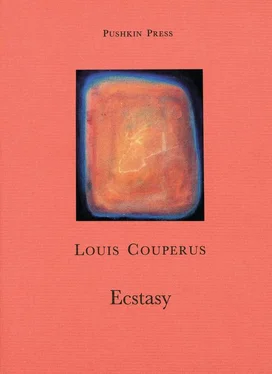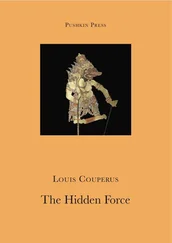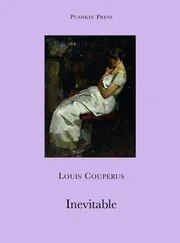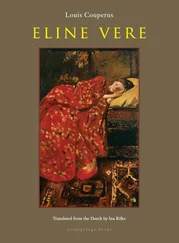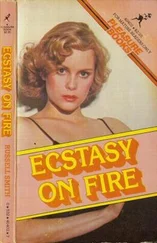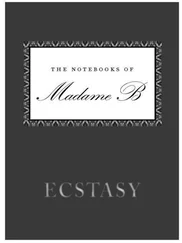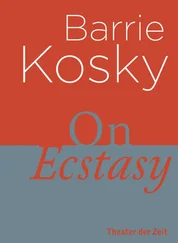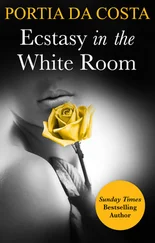He was still, and she held him fast in her embrace.
“I thank you,” she said, “that you have taught me this and how to be happy as we are, and not otherwise. You see, when I still lived, and was human, a woman, I thought I had already lived before I met you, for I had had a husband, and children of whom I was very fond. But from you I first learnt to live, to live without egoism and without desire; I learnt that from you this evening or … this day, which is it? You have given me life, and happiness, and everything. And I thank you, I thank you! You see, you are so great and so strong and so clear, and you have borne me towards your own Happiness, which should also be mine, but it was so far above me that without you I should never have attained it! For there was a barrier for me which did not exist for you. You see, when I was still human,” – and she laughed, clasping him more tightly – “I had a sister, and she too felt there was a barrier between her happiness and herself; and she felt she could not surmount this barrier, and was so unhappy because of it that she feared lest she should go mad. But I, I do not know: I dreamed, I thought, I hoped, I waited, oh! I waited, and then you came, and you made me understand at once that you could be no man, no husband for me, but that you could be more for me: my angel, O my deliverer, who should take me in his arms and bear me up over the barrier into his own heaven, where he himself was master, and make me his queen. Oh, I thank you, I thank you! I do not know how to thank you; I can only say that I love you, that I adore you, that I lay myself at your feet. Remain so, and let me adore you, while you kneel where you are. I may adore you, may I not, while you yourself kneel? You see, I too must confess, as you used to do,” she continued, for now she could not but confess. “I have not always been straightforward with you; I have sometimes pretended to be the madonna, knowing all the time I was but an ordinary woman, a woman who frankly loved you. But I deceived you for you own happiness, did I not? You wished me so, you were happy when I was so and not otherwise.
“And now, now too you must forgive me, because now I need no longer pretend, because that is past and gone away, because I myself have died away from myself, because now I am no longer a woman, no longer human for myself, but only what you wish me to be: a madonna and your creature, an atom of your own essence and divinity. Do you then forgive me the past? … May I thank you for my happiness, for my heaven, my light, O my master, for my joy, my great, my immeasurably great joy?”
He rose and sat by her, taking her gently in his arms.
“Are you happy?” he asked.
“Yes,” she said, laying her head on his shoulder in a giddiness of light. “And you?”
“Yes,” he answered, and he asked again: “And do you desire … nothing more?”
“Nothing!” she stammered. “I want nothing but this, nothing but what is mine, oh, nothing, nothing more!”
“Swear it to me then … by something sacred!”
“I swear it to you … by yourself!”
He pressed her head to his shoulder again. He smiled, and she did not see that there was melancholy in his laugh, for she was blind with light.
V
They were long silent, sitting there. She knew she had said many things but she no longer knew what. About her she saw that it was dark, with only that pearl-grey twilight of stars above their heads, between the black boughs. She felt that she lay with her head on his shoulder; she heard his breath. A sort of chill ran down her shoulders, notwithstanding the warmth of his embrace; she drew the lace closer about her throat, and felt that the bench on which they sat was moist with dew.
“I thank you, I love you so, you make me so happy,” she repeated.
He was silent; he pressed her to him very gently, with simple tenderness. Her last words still sounded in her ears after she had spoken them. Then she was bound to acknowledge to herself that they had not been spontaneous, like all that she had told him before, as he lay kneeling before her with his head at her breast. She had spoken them to break the silence: formerly that silence had never troubled her, why should it now?
“Come!” he said gently, and even yet she did not hear the melancholy in his voice, in this single word.
They rose, and walked on. It came to him that it was late, that they must return by the same path; beyond that his thought was sad with things he could not have uttered; a poor twilight had come about him after the blinding Light of their heaven of just before. He had to be cautious: it was very dark, and he could barely see the path, hesitating, very pale at their feet; they brushed the trunks of the trees as they passed.
“I can see nothing,” said Cecile, laughing. “Can you see the way?”
“Rely upon me; I can see quite well in the dark,” he replied. “I am lynx-eyed …”
Step by step they went on; she felt a sweet joy in being guided by him; she clasped his arm more closely, saying laughingly that she was afraid, and that she would be terrified if he were suddenly to leave hold of her.
“And supposing I were suddenly to run away and leave you alone?” said Quaerts.
She laughed; she besought him not to do so. Then she was silent, angry with herself for laughing; a weight of melancholy bore her down because of her jesting and laughter. She felt as if she were unworthy of that to which, in radiant light, she had just been received.
And in him, too, there was melancholy: the melancholy that he had to lead her through the darkness, by invisible paths, by rows of invisible tree-trunks which might graze and wound her; that he had to lead her through a dark wood, through a black sea, through an ink-dark sphere, returning from a heaven where all had been light and all happiness, without melancholy, or any darkness.
And so they were silent in their melancholy until they reached the high road, the old Scheveningen Road.
They approached the villa. A tram went by; two or three people passed on foot; it was a fine evening. He brought her back and waited until the door opened to his ring. The door remained unopened; meantime he pressed her hand tightly, and involuntarily he hurt her a little. Greta had no doubt fallen asleep.
“Ring again, would you?”
He rang again, louder; after a moment the door opened. She gave him her hand for a second time, with a smile.
“Goodnight, Mevrouw,” he said, taking her fingers respectfully, and raising his hat.
Now, now she could hear the sound of his voice, the note in it of melancholy …
She knew, the next day, when she sat alone in reflection, that the sphere of happiness, the highest and brightest, may not be trod; that it may only beam upon us as a sun, and that we may not enter into it, into the holy sun-centre. They had done that …
Listless she sat, her children by her side, Christie looking pale and languid. Yes, she spoiled them, but how could she change herself?
Weeks passed, and Cecile heard nothing from Quaerts. It was always so: after he had been with her, weeks would drag by without her ever seeing him. He was much too happy with her, it was too much for him. He looked upon her society as a rare pleasure to be very jealously indulged in. And she, she loved him simply, with the devoutest essence of her soul, loved him frankly, as a woman loves a man … She always wanted him, every day, every hour, at every pulse of her life.
Then she met him by chance at Scheveningen, one evening when she went down there with Amélie and Suzette. Then once again at a reception at Mrs Hoze’s. He seemed shy with her, and a certain pride in her forbade her asking him to call. Yes, some change had come over what had been woven between them. But she suffered sorely, because of that foolish pride, because she had not humbly begged him to come to her. But was he not her idol? What he did was good.
Читать дальше
